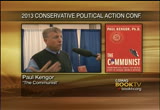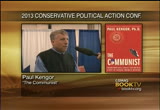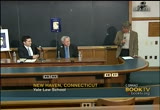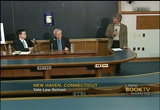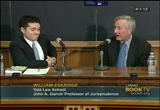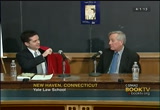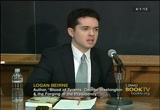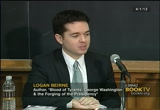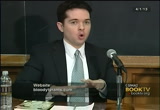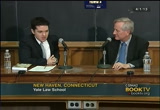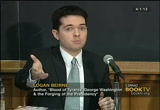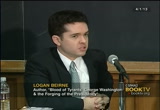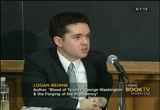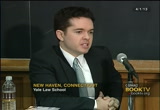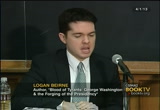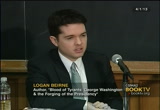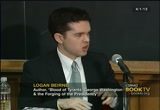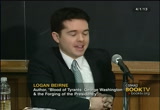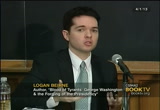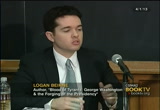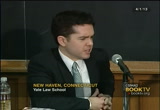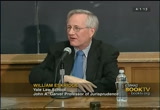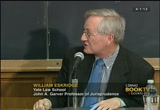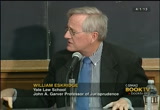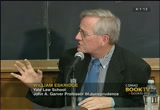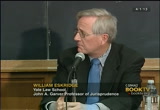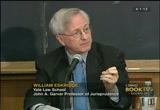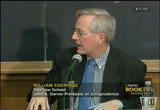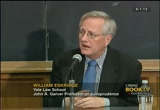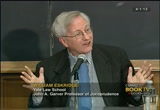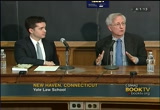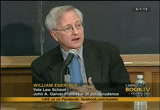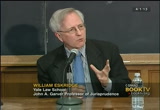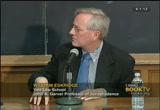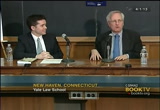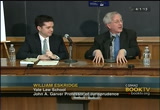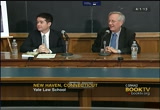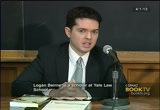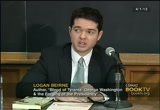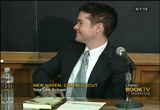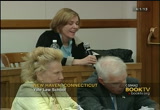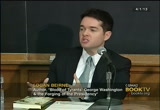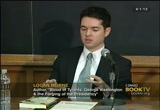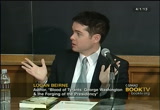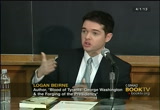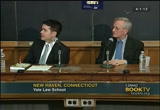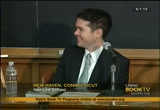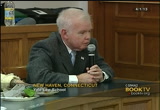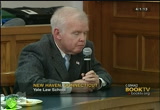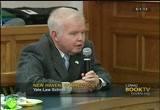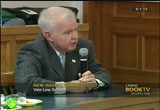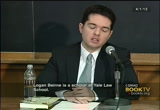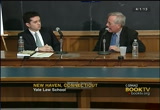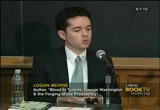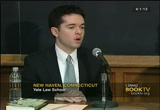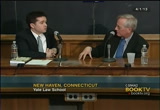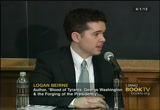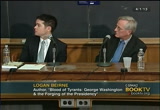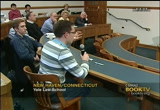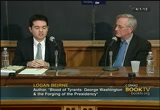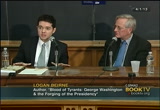tv Book TV CSPAN April 21, 2013 11:00am-12:01pm EDT
11:00 am
11:01 am
>> and now on booktv, logan beirne examines george washington's thoughts on politics and government during wartime. this is a little over one hour. >> good evening. i'm the director of the yale law library and i'm here to welcome you to the library booktalk sister i want to thank the founders society for cosponsoring tonight's talk. tonight's program features logan beirne who is the author of a new book on america's first chief executive entitled "blood of tyrants: george washington and the forging of the presidency." this is very much a yale law school block. it began as a paper while logan was a law school student. the paper was written -- after graduation from law school in
11:02 am
2008 and working two years in a law firm, logan returned to yale law school in 2010 as a scholar and began turning the paper into the book that we feature tonight. appropriate laid we have the professor with those to comment on the book. professor is a highly distinguished member of the yale law school factoid. is the author of numerous books, monographs and articles, and several of his books have been featured in previous book club series sponsored by our library. according to a recently published study by my colleague, fred sugar, professor eskridge is one of the most cited legal scholars in the known universe. just one or two of these have been cited more than her fetzer eskridge but that was a mistake. last but surely not least, he's
11:03 am
a dynamic and innovative teacher and a wonderful mentor to young scholars like logan. without further ado i will turn it over to logan. >> thank you very much. i'd like to add that the professor is particularly fitting for this talk because he's a descendent of george eskridge who is the godfather of our nation. when mary bolcom george washington's mother, was orphaned at 13, george eskridge occur in. and in gratitude for that she named her firstborn son after him. so thank you, thank you for coming today. [laughter] >> logan beirne, he's quite right but logan beirne is also a descendent of distinguished forebears who have a relationship to george washington. as most of you know who note any history of george washington from george washington participate in the french and indian war. that was probably his first real
11:04 am
military experience. and one of the officers serving under him, the most doug ridder officer under him was officer dandridge who was a lineal ancestor of logan beirne i believe on his mothers side. and, indeed, after an important battle, one of the few battles the george washington actually one, against, he turned over the sash of general braddock to his trusted and decorated officer, officer dandridge. and we have the sash here today. which we will award to logan beirne. [laughter] [applause] >> thank you. >> the braddock sash. which makes logan beirn logan by upper of the author for today's book. >> they carried braddock's body in islam might take it off. it's funny because professor
11:05 am
eskridge and i, our families tobacco long way to colonial virginia. in fact, the last time that we sat around speaking of articulate about politics, it started a revolution. so are you sure this is safe? if yale law school as a hotbed. >> so this ancestry and heritage comes into this book quite a bit. mind being revolutionary heritage, but also i'm fascinated by the fact that each and every one of us has a rich family heritage. i think it's important we remember that and learn from it. and this book itself is actually on our national collective heritage, and what we might learn from the founders when they were, what it meant to be the american commander in chief during the revolutionary war. so this book actually started way, way back when i was very young. my father would take us to a
11:06 am
reenactment of the battle of lexington every year without fail. and it would be a freezing cold morning in april and we would be watching the reenactors put on the role of the battle. their part was -- my favorite part was the breakfast afterwards. it was wonderfully hokey, the waiters and waitresses would dress up in period costumes and they would act the role of different patriots. my father having a very dry sense of him, he would torture the men dressed as washington and try to make and break character. it was very historical. eventually i got every year would laugh if eventually. so that's the story, about a decade or two later i'm sitting in professor eskridge's constitutional law class, and you're describing article ii, section two, commander in chief
11:07 am
clause. all that says is that the president shall be commander in chief of the army and navy, and it doesn't say much more. however, presidents throughout history have cited this commander-in-chief power for various means, whether it's prisoner torture, military commission, our vis-à-vis congress, all sorts of powers has been read into this clause. so you said too bad we can't ask the founders what they had in mind. i instantly thought of that waiter, and i thought why don't we just ask them? i did the next best thing. i actually went to the library where teresa helped me go through the primary sources, the actual collection that we have here of documents and diaries and newspaper clippings. and really getting a thorough
11:08 am
look at what these sounds were saying to one another and what they believed and understood the term american commander in chief to mean. sure enough i kept on working on it, and i turned in my first draft it do you remember what you said? >> i like the title. it was george versus george. and the georges were george washington, george iii and george w. bush. if you did like the top but you asked for more. so here's more. so i kept on working and eventually evolves into the book that we have coming out in the next couple of weeks. and what really struck me when i stood my research and nationally was a quote from washington where he said the foundation of her empire was laid not during a
11:09 am
gloomy age of ignorance and superstition, but during an epic when the mankind was redefined in this auspicious period the nazis came into existence as a nation, and their citizenship not be completely free, and happy, the fault will be entirely their own. wow. i saw that as a personal challenge to each and every one of us to learn about this auspicious period and understand what was happening in that epic to see when the founders got together after the revolutionary war to write the constitution. who was at the front, the front and center as the president of the constitution convention, but george washington, the commander in chief who had led them through the struggle and it forged and defined what it meant to be the american commander in
11:10 am
general, and really the president that they were creating with the constitution. everyone knew that george washington would be the first president. in fact, when it came time to elect them come he received every single vote. so as i was researching this book i came across all sorts of fascinating and really juicy and somewhat scandalous stories, some of which sounded like they were headlines from today regarding torture, regarding military commissions. we see, we're still discussing the mastermind of 9/11 10 years after his capture, and what rights does he deserve? they were debating the same things back then. or even congress, congress were meddling in the president war powers but that was a big discussion during the revolutionary war as well. so today i would like to start off and hope i get into some the other stories as well, i would
11:11 am
like to start with one store in particular because i think it helps to establish a reoccurring principle that i found time and time again while writing this. and that is the divide between presidents and the commander in chief's power over foreign nationals and defending us from foreign forces, versus his power over american citizens, and sort of what power does he have to defend us from one another. so it really, the story begins at a small band in upstate new york in the hudson river, and right now when you think of west point you think of well manicured lawns. you think of our nations future military elite rushing to and from classes. you think of monumental buildings take you don't realize that back in 1780 it was a fledgling little fort ever beheld the state of the nation.
11:12 am
basically, the british were interested in capturing the entire hudson river because they were wanting to cut off the rebellious new england states from the rest of the nation. and that would have effectively, that would end the revolution if they were able to do so. so what the americans did not having a navy ourselves, we constructed a land-based defense. now, benedict arnold, he knew how valuable this was. so he concocts a plan to sell it for approximately 26 million u.s. dollars today. and where the story gets most interesting, most people know about benedict arnold but the story gets most interesting when you look at his co-conspirators who are less known. john andre, he was british head
11:13 am
of intelligence under general clinton. and then joshua smith. so when it came time for benedict arnold to be trade his country, he met with john andre to form a plan of attack and give him the plans of west point, let him know where might he be attacked from in order to quickly win. and they met on the side of the hudson, downriver from west point in a wooded area. and they were bickering the whole night about how to best do things. you've heard of arnold. you could see how he was sort of not a very amenable fellow. you still squabbling about the price. he was going on and on. but sure enough the sun comes up while they're still talking.
11:14 am
and andre ship is fired upon when the patriots did and he is trapped at the arnold says, okay, smith, andre, let's go back to smith's house and we'll figure out another way to get you back to safety in british controlled new york city. so they get back to the house, and arnold says, quick, put on smith's jacket or this will disguise you. so everyone will think that you are an american. and smith, do me a favor and ride with him back down community to make sure he is safe. so everything seems great. they ride along, and they come to about tarrytown in westchester. and smith by this point, he is pretty tight give it up the whole night and a couple months before, and he wants to go back and say there's we turned around. sure enough, six miles after the
11:15 am
part, andre is jumped by some militiamen, and the christian, they strip searching and defined plans to west point in his suit. quickly, the whole plan starts to unravel, and arnold gets wind of this and he escapes. he gets away and he then, washington finds out, and he quickly sends his men to get joshua hett smith. now it's very striking, and he has, washington has john andre, the british officer, and joshua hett smith, the american loyalist involved in at the exact same plot. they both have damning evidence against them. in fact, he said to smith when he was interrogating him, he said, i have enough evidence to hang you on yonder tree. but he doesn't if he doesn't hang him on yonder tree.
11:16 am
instead, for smith, he provides them with a court-martial, which is a type of military trial, dating back to the 13th century, king richard the first, in which there are some safeguards and there's an element of due process to make sure that the accused has a fighting chance to defend themselves. and the panel is charged with actually deciding whether this man is guilty or not. so after about, i think it was four weeks of trial, smith has damning evidence against him. they have all these witnesses that are testifying, to the familiarity between andre and smith, and also showing the code that smith had used to disguise a british officer which is a big no-no. and despite that, they come at
11:17 am
the end of the truck, they realized that because he is an american, he has the proof and we need to prove that he knew what he was doing was wrong. and they couldn't. with a high burden he was acquitted. people were shocked. in fact, they were so shocked that the civilian authorities took him back to prison on other charges. those didn't stick. and others for. he actually is a slippery character and he escaped dressed as a woman, made it back to new york. but andre -- andres state was far different. instead, washington ignores the resolution on the books and says, enemies of this sort shall be tried by court-martial but instead, he does his own thing and trades the military commission to the military
11:18 am
commission, sometimes near a court-martial but it doesn't have to. there's no right to due process. it really is up to the whims of the commander to determine whatever rule that he wants. it's seen as sort of a quick and dirty way to punish the accused. they are not even looking to see if this man is killed. they are thinking what punishment does he deserve, and sort of assume he is guilty. so andre, he receives, i shouldn't call it a try. a two-day trial in which they basically a bunch of evidence against him and he stood defenseless and friends. he does have a chance to confront his accusers. sure enough, he is hanged. washington, he felt for the john andre but he really felt the real enemy was arnold.
11:19 am
this young man who was a very likable character, he was sort of caught in this sordid mess. and at the same time washington felt very strongly that his job, his role as the american commander-in-chief was to defend the nation, and he needs to send a very strong signal that those who cross him and potential harms his people, they will be punished severely. so when i was going to just talking about this, the title of the book. it's called "blood of tyrants," and i gave it that title after the famous jefferson line, the tree of liberty must be refreshed from time to time with the blood of patriots and tyrants. which i find very startling, if you think about it. i think that the founding fathers, the whole founding generation in general, they saw two great the government that we
11:20 am
have no and a constitution that we still use two spirits of the bloodshed that they endured. they wanted to create a democratic republic with people were protected. so they wanted to give the president the power to protect them from foreign tyrants, but not so much power that it could be a tyrant himself. thank you. i look forward to questions and hope to work more stories. >> great. litanies to say a few words, really following on the presentation. i wrote a blurb for the book. it is quite a page turner. the book is about george washington. what's not to like about that? and it really is quite an excellent page turner, but the reason i supervise the paper and the original whole project was to think about, the commander-in-chief clause has an
11:21 am
argument for a number of important cases. steel seizure case. that was one of president truman's legal justifications relying on an opinion by robert jackson who was then on the court, for the proposition that the commander-in-chief clause gave to the president in time of war some authority to cut estate property until. for a war that was not being fought on american so, unlike the american revolution. so we see this long ago, important moment in the seizure case, and we continue to see it as the war on terror, most recently we have seen it on debates over the president obama's continued engagement in the libyan hostility. apparently contrary to the war powers resolution, which thinks is constitutional but as he told my class, he said but it's not constitutional as to all
11:22 am
applications. and apparently the obama administration felt it would be unconstitutional for congress to provide too many limits on the president's power to conduct hostilities against libya. now where those are we don't really know. so the commander-in-chief clause is actually a very important constitutional provision. and logan's project i think is the first one to actually give it some legal purchase. what might've been the official meaning of the commander-in-chief clause. because windows was drafted at philadelphia, i think the only commander-in-chief bid on was george washington. they certainly did not have george iii in mind. they did not have even governors in mind. governors were also the heads of the militias in various states. those also not their goal. but instead their model, if they had one, they probably did, was george washington.
11:23 am
one of the many things logan's book does in wonderful detail, it really does give you an idea, not just of the fact that george washington was universally exclaimed, but some of the reasons he was reasonable -- admired. he was not a successful general at any point in his career. he was not an attention grabber. he was not a self publisher. partly because of, he became this universally admired figure and is really a model for commander in chief cause. so i think it's an extraordinarily relevant both as constitutional matter and thinking about either the original meaning or the ongoing meaning of the commander-in-chief clause to know something about the experience that actually produced this clause. and then i think as everybody expected her to washington to be
11:24 am
than the first president in the first commander-in-chief under article ii of section two of the constitution. now, i think there are come you have to read the book to get the full flavor of this that logan has given you this wonderful story about the court-martial and the military commissions. i think here are three things that occurred in the book, and the book does have bearing, and this is a good reason to read it as well. you want to direct issues of torture our military commissions, and which did have parallels during the revolution when washington was commander in chief. and he did take a liberty to torture, what we would say consider torture some of the enemy soldiers that had fallen into his hands. and he did on some occasions deploy military commissions rather than court-martials. to even execute spies and others such.
11:25 am
i think that's very interesting but i think there are three broader lessons that recur throughout the book. the one that struck me the most, but i think remains relevant today as a structural matter is that there was an operative congress for most, not entirely all, of george washington's tenure as commander-in-chief. and i was very struck, and you can even write another book on this, that have utterly respectful washington was of the instructions that he got from congress. so this is someone who was and often an aggressive, he was not bashful about using the power he been given. he also forward this approach during his presidency. he was very interested in the
11:26 am
views of the continental congress. he was very respectful to the continental congress passed directors, and he generally followed it. and this book is a wonderful example of what a republican, small r republican theory such as what animated the revolution itself, the principles of the constitution after the revolution, was that might mean for the commander-in-chief. and there's a certain degree of humility that washington displayed as commander-in-chief toward the directives of the continental congress. and i might add, this is the same point, there was also an extraordinary amount of humility that washington displayed as regard to the law of the nation. so even when he would be delegated discretion by the can't know congress for this wonderful treatment, and the character we all have of plunder is, you know, 18th and 19th
11:27 am
system this is what armies did. well, according to logan's count, not so much the transfer. and it did jenna washington, please correct me, logan, on more than one, would execute his own people for engaging in plunder contrary to his instruction. in other words, taking food, property, et cetera, et cetera. so this is the opposite. this is not only where he was authorized by the continental congress to take food and property, and did not, but in deference to what he considers either a law of war or what the love or should be, jenna washington played using. so i think it is very remarkable and i think that's the first remarkable thing about this account, which i think helps us understand the original meaning
11:28 am
of the commander-in-chief clause and provides someone who's think about it going forward, the country has changed. second point, the second point which i think is also very interesting is that if you are the commander-in-chief, washington provides the first example, and it will be followed i subsequent examples of the inherent dynamism that comes with being the commander-in-chief. in other words, you can have directives from the continental congress. you can have even a grimace on the part of washington and his own generals, but the conditions of the battlefield, the conditions of strategy beyond the battlefield, the conditions of the ongoing evolution of the political situation meant that george washington had to
11:29 am
improvise quite a lot. so even the faithful agent which he revealed himself to become and this was one reason he was so universal admired companies in the faithful agent was a highly dynamic interpreter of the discretion as well as the restriction adopted by the continental congress. sometimes he would go against the restriction. sometimes he would refuse to exercise his discretion. based upon what he thought was appropriate and needed for the larger strategic and military goal that he was vested with. and what locus book does commission as you the lengthy parts of the ship that was our fighting force in the revoluti revolution, really about every 50 pages of locus book were about to lose the entire shebang because of there is circumstances. it does very interesting take on the revolution. and one of the things that
11:30 am
washington did, he responded brilliantly to terrible circumstances. and he would sometimes violate the restrictions given to them by the continental congress. i think that's an example of the dynamic statutory interpretation and perhaps -- there is a third point, which i think is really quite remarkable about this book which i never really thought about, or really even know enough about and what reading i've done about the revolution. ..
11:31 am
as logan does that for us, president washington did direct the torture on occasion of enemy soldiers who had been captured. what i thought was interesting about logan's account was how rarely this occurred and that it tended to be tightening to a notion of reciprocity and this is the big theme about lamar generally. it's interesting to thing sounded interestingly and bigger revolution that general washington had reports that the british were mistreated and sometimes we didn't know the
11:32 am
details or maybe registering to be discreet about the horrors of it. washington would here about british mistreatment, he would often make a show or even just a charade about going to visit the same circumstances upon prisoners that we have pitcher visited on american forces. there's a kind of targeting that went on in the revolution between washington and his opposites on the british side about how prisoners of war should be treated. i think that's very interesting because it gives us excellent insight into the way in which the ground-level is not just direct use by conventions and not just battlefield decisions by the commanders, but also the
11:33 am
dynamics of treatment and reciprocal principle washington, to some extent as well. that would be another great book. right from the british point of view. one criticism i would make is the birds are kind of fall guys. however bedraggled washington's forces are, general howe was around new york city while washington -- you could have wiped them out commit general cornwallis, overconfident pat him down.
11:34 am
the bread take too much fall guy. this is a federalist society. is there not a branch of the federalist society? i would supervise this. when i was in the teaching market, alan schwartz interviewed me for a job. but the revelations from the british point of view. we rather unruly and i'm not so sure, but it's a great day we consider the resolution. they would've been in slavery like 50 years earlier. to the remaining part of the commonwealth. canada got free about the same time. so i am actually kind of aory.
11:35 am
i think there is a tory point of view to be written. a lot of these federalist society officers shaking their head yup, got my soul here and i think that would be very useful. that's a little bit of a diversion, the you can see some of the larger normative implications that i hope to stimulate smarter conversation about the early days -- confirm commander-in-chief clause in constitutional debates as well as larger separation of powers today. i'd yell back >> we know that lincoln and the civil war was very much can i about the fact that he would have to be assimilating and
11:36 am
integrating the south after the war was over. i'm wondering what was going on during the american revolution and whether washington was motivated in its attitude about justice towards the troops by a sense that loyalists would stl be visiting in the midst, even in the event washington prevailed and the revolutionary succeeded. >> absolutely. that's an excellent point. the revolutionary war with the civil war. people forget that. 40% of the population where peachtree appeared another 40% weren't different. in the remaining 20% were loyalists. what is fascinating about the way washington approached it with these loyalists were still american citizens. they were seen as the dissenting minority within the republic. and so come if they broke the
11:37 am
law of the majority created, they would be punished, but they were still american according to george washington. so when the soldiers would be starving, david go out to the loyalist homes particularly and ransacked them. washington would do it thorough investigation and find these men and sometimes have them executed. the thinking behind this was this is a war she was trying to mend the populist over and also define what it meant to be an american nation. so at the end of the day, they went to brighton or elsewhere, but knew they would be staying in more americans than
11:38 am
republican values required that he treat them with respect. >> your story about andrea almost flies in the face of that logic in the sense that is the opposite. >> john andre is the british. he was hanged after two days in the commission, the senate caught in the exact same circumstances was a loyalists and he think he would be given the same treatment. he wasn't. he was given rights. he was given weeks and weeks of trial. >> please rate for the microphone, though. >> thank you, low down. assigned to teach you and it's going to be fun to read this book. a couple of questions. first, let me point out, andre
11:39 am
violated the laws of war by his actions. so he's going to be tried someplace. where would you suggest he be tried and it's not clear to me the international on required courts of commercial of himself. canada did not become dependent until 1867. there were minor skirmishes before then. it could've been a long time. but my real question is what about the articles -- >> slaves did not become free until 1866 in this country. that's about the same time. from the point of view of many americans they were not free until the same time canada was. >> i was correcting the record he set around the same time. my real question had to do with
11:40 am
articles of confederation. they use the term commander-in-chief. one of the things that could not be done was appointed commander-in-chief. in fact, much of the articles of confederation are about making war. they really scared by this recent experience. i wonder if elected any materials that there's anything to learn from that. perceiving the constitution. >> thank you very much. regarding andre, washington did the same thing. the congressional resolution didn't say to use a court-martial. however, washington realized he could not affect the blade from the message that he needs to stand. so use the military commission against andre, so that's
11:41 am
regarding your first point. regarding the articles of confederation, they were a bit of the mass. so washington as commander-in-chief inmate to 75 before the articles were not good. the article is in the governing documents under which we were being governed, was messy because it's used in charge. initially the cotton until congress micromanaged washington and had various committees to cover the war effort. the war effort under the articles are a schizophrenic squirrel, jumping problem to problem and correct mistakes and who's in charge.
11:42 am
when we get to new york, washington doesn't think he can defend new york city. we have no navy and were fighting the greatest navy on earth. why are we trying to defend an island? he did lose more bottles, that he was smart enough to know he should not be defending the island. congress says no, we expect you to make every effort to defend us. they lose badly, not surprisingly so. by the time the british are chasing the army towards philadelphia, that's when congress finally says ra, this isn't working. we need to change what it means to be the american commander and that's when they grant washington with dictatorial powers and that's with a sort of a just to make up of how they're
11:43 am
going to run this war. originally they reconvene in baltimore. but once they reconvene, in that week, washington starts getting affect together. congress has just keep these people away from washington. dictator back then was not a dirty word. get full military control to make decisions. he was a political dictator or he could cover the law that congress never gave up their power over the people. over the military, he became the number one in charge. they kept extending this dictatorship over and over and that is how they came to create this american commander-in-chief through fits and starts to begin
11:44 am
with a weak commander in end with a strong commander over foreign nationals. >> are you making the argument or at least a suggestion that the term commander-in-chief is used in the constitution and asked previously in the articles they commander-in-chief who washington was that dan cammarata continental congress congress had given powers of the military commander. >> is absolutely right, and evolving term. didn't mean that much as they learn from the war, came to mean a whole lot more. >> do you have contemporaneous notes the reflections are
11:45 am
letters at either the constitutional convention or previously to determine all this baggage? >> the congressmen were debating this ferociously and washington himself is trying to determine i have all these powers now. which one should i use? what should i not use? it was an experiment in america was a great experiment from the start and especially the commander-in-chief were experimenting besides him the congressional side as well as military site. >> the next is a distinguished man also named bernie. >> thank you. one of the things washington had in july, not that much longer
11:46 am
after that, washington becomes commander-in-chief. who was appointed to him was a were council and arrived on the scene right redish trapped in boston. i don't hope they talked money then. did they talk moneybag? >> washington said wait a minute, not the greatest general the world, but i've got these people trapped in one town. they try to get out and check it out. what we get the bananas were? they said you might role in the town. despite they beat the yankees today. in the book, but denies a couple of things that are very dramatic. these are thoroughly researched
11:47 am
because he had me going around in circles, researching some of this stuff. what he had was 22 years old at the time. and he also was a surveyor and the french are going into the lands in a survey this way or that way. they would say this is our spirits of the british that it's the same. so they get ahold of washington who is a surveyor and military person and they sent him out with a group of surveyors and builders to do with the french are doing. he had gone to live when he ran to this group of indians and the head ndn -- at a number of these names, but they had indians settle help you out. i know the french. they are not happy with the people being out here.
11:48 am
we'll also help you as far as keeping the french away. so washington being 22 years old used all the help he could and he did. said the indians go up and come back shortly and said there's a group of french soldiers out looking for you and they're on the way down. unbeknownst to washington, had indians in this particular group, his father was killed by the french colonel who was the local colonel leading this group of people coming down the hall. [inaudible] >> said what he did come he tells washington they are coming down here and washington sets up a trap and kills 46 of them.
11:49 am
later on, the king of england said a young man stared at the french and indian war because the french did take too kindly to this happening. when they killed and scallop 46 french surveyors, workers, soldiers, whatever, diplomatic party in the head indian burns the colonel who killed his father, chops off the top of his head, reaches into his skull and brings that his brain and suddenly his father said i avenge you, father. i think that would disturb me a little bit if that happened, but there was then that she do. when he reported back to england, as far as what went on,
11:50 am
he said we ran into some french military. the local indians hope is subdued on and the words he is was the thrill of the bullet flying through the air gave thrilled to my heart and that was his interpretation. >> that impacted his approach. originally when he was at boston, he was listening to every word of his were council that congress had appointed for him. it was filled with note essays they really knew little about war, but yet washington felt obligated to listen to every word they said. he came to new york, didn't want to withdraw early enough. and he listened. but once he becomes dictator,
11:51 am
congress has come you keep listening to the were council. go ahead and stop. says the work concludes, actually all happened pretty much in the beginning of the war as the middle of the end of the war, he stopped listening to the were council, but he didn't feel any longer he became a confident in his ability to get to it with the military was going to do it when he went commander and one person in charge to defend the nation. >> by the way, do you mean even by the end of the war he was assuming powers that congress had assumed he was still listening to congress, even though he didn't have to tell it to the world. >> i describe that as the military to tator versus apolitical dictator. through my back to the roman
11:52 am
republic was given powers of the roman senate villages defended it took full control. the americans love the classics and they knew all about this. but they have their own twist on it and the tourist is we give you all military power over defeated the enemy. they still retained at all, so washington was unique among revolutionary generals and that he never declared martial law. whenever it came to a matter of american citizens, american property, he made sure to defer to congress or the state authorities. said a defined way of being a
11:53 am
control over the military and tactical decisions come he was dictator when it came to the host of other political decisions being made, he was very careful to not infringe upon congress. >> other questions? yes commissary. >> banks. a day to up on the andre smith example pic my understanding is congress tried essays by chris smith was tried for tradition. is that citizens should to the subject of either of them? >> so what is true -- they're both involved in the same conspiracies. or both involved in the same plot. washington's knee-jerk reaction was to have them hang as well. so when he came down to it, he
11:54 am
was wasn't as sweet as bad as he was by the nationality and getting back to originally these loyalists were americans and they had rights were potentially going to have to live with them after we war was trying to win the hearts and minds of the american people. for washington, he was not looking that distinguish a nasty letter. he was were these two men were in cahoots, they work together and they outmuscled west point. >> just to clarify that point, both of them are supposed to have been tried by court-martial. that's the way it is congress side. and so, washington was making
11:55 am
the bigger move indicates of the unauthorized tribunal. >> against foreign enemies acting as spies and another resolution that direct did americans precluding with the enemy of both of them said were going to try them out for the court-martial to do protections. for example, the board, a special opposed they were trying to decide guilt. other provisions like washington as a convener of the court-martial could not say as the president of the committee. there were definitely safeguards in there to make it a fair
11:56 am
trial. i.d. imac >> the question is over specific charges against ponderings retrospectively? >> for both of them, it is working to betray west point. originally they had 10 charges against smith and a narrowed it down to one very general charge, which was either working at the enemy to betray west point and for andre, it is similar. it is your working at benedict arnold to betray west point and you are doing so in disguise. >> follow up on that. yes commissary.
11:57 am
>> i'm british, but i promise i'm not a spy. >> check-in. >> welcome. >> when the talk about love for during the revolutionary. companies seeking the prisoners come acceptability, thinks lake reprisals in things like that. but we are not in that law paradigm anymore to try to stop things and try to ensure better treatment of some kind of reprisal. my question is how does that development in the international thought of conflict affect washington for military
11:58 am
commissions like that today? >> that is an excellent point. i would go so far as to say washington did he asks that we should do x today. instead, i take the more humble approach, where washington created was meant to be the american commander and they think it's important for us to look at that history, and basically anyone who believes in democracy to do so. in the preamble of the constitution, it doesn't say congress or a more perfect union. the constitution was formed by reader people, so it is poured when they look to see with mean. iic will be people thought we were enacting article ii,
11:59 am
section two. the bass or two today. sure about his change. you are mentioning how torture is often used for reprisal and a service which that to a more individualized system of justice. at the same time, the history is an important starting point for these investigations and some people -- there's big debate about original estimate how much way you should really give it. when it comes down to it, it is important precisely because major players believe so. for example, look at the washington d.c. color decision in which the supreme court, both sides are using historical arguments to decide these cases. so ritualism is alive and well and varied port to look at the
12:00 pm
history is at least a starting point as we discussed these issues. >> let me follow up on that. tell me if this is one of the lessons to draw from your account because some of the punchlines of your book is the concept of the republican expanding of the commander-in-chief clause and a major set of circumstances that we have the serious international commitment. ratified by the senate or the law of the land. and it sounds to me like one of the punchlines of your account, even though washington powers did grow, he did have a republican understanding, which required him to be very attentive to the commitments that were made by the nation. in the 1770s, we
68 Views
IN COLLECTIONS
CSPAN2 Television Archive
Television Archive  Television Archive News Search Service
Television Archive News Search Service 
Uploaded by TV Archive on

 Live Music Archive
Live Music Archive Librivox Free Audio
Librivox Free Audio Metropolitan Museum
Metropolitan Museum Cleveland Museum of Art
Cleveland Museum of Art Internet Arcade
Internet Arcade Console Living Room
Console Living Room Books to Borrow
Books to Borrow Open Library
Open Library TV News
TV News Understanding 9/11
Understanding 9/11